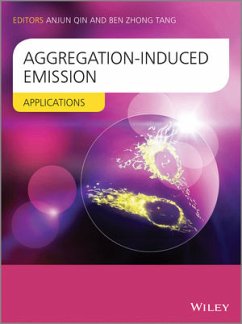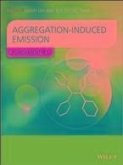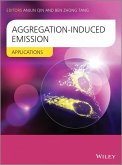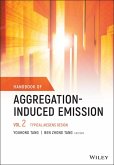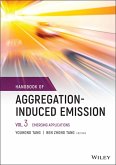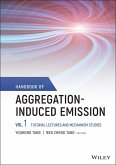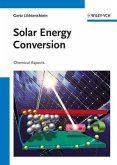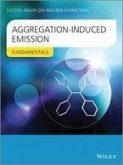

Alle Infos zum eBook verschenken

- Format: ePub
- Merkliste
- Auf die Merkliste
- Bewerten Bewerten
- Teilen
- Produkt teilen
- Produkterinnerung
- Produkterinnerung

Hier können Sie sich einloggen

Bitte loggen Sie sich zunächst in Ihr Kundenkonto ein oder registrieren Sie sich bei bücher.de, um das eBook-Abo tolino select nutzen zu können.
Edited by the academic who first discovered this important phenomenon, Aggregation-Induced Emission is the first book to cover the applications of Aggregation-Induced Emission. This groundbreaking text explores the high-tech applications of AIE materials in optoelectronic devices, chemical sensors, and biological probes. A valuable resource for scientists, physicists, and biological chemists, topics covered include: AIE materials for LEDs and lasers; mechanochromic AIE materials; new chemo- and biosensors based on AIE fluorophores; AIE dye-encapsulated nanoparticles for optical bioimaging; and…mehr
- Geräte: eReader
- mit Kopierschutz
- eBook Hilfe
- Größe: 16.24MB
![Aggregation-Induced Emission (eBook, ePUB) Aggregation-Induced Emission (eBook, ePUB)]() Ben Zhong TangAggregation-Induced Emission (eBook, ePUB)161,99 €
Ben Zhong TangAggregation-Induced Emission (eBook, ePUB)161,99 €![Aggregation-Induced Emission (eBook, PDF) Aggregation-Induced Emission (eBook, PDF)]() Ben Zhong TangAggregation-Induced Emission (eBook, PDF)122,99 €
Ben Zhong TangAggregation-Induced Emission (eBook, PDF)122,99 €![Handbook of Aggregation-Induced Emission, Volume 2 (eBook, ePUB) Handbook of Aggregation-Induced Emission, Volume 2 (eBook, ePUB)]() Handbook of Aggregation-Induced Emission, Volume 2 (eBook, ePUB)201,99 €
Handbook of Aggregation-Induced Emission, Volume 2 (eBook, ePUB)201,99 €![Handbook of Aggregation-Induced Emission, Volume 3 (eBook, ePUB) Handbook of Aggregation-Induced Emission, Volume 3 (eBook, ePUB)]() Handbook of Aggregation-Induced Emission, Volume 3 (eBook, ePUB)201,99 €
Handbook of Aggregation-Induced Emission, Volume 3 (eBook, ePUB)201,99 €![Handbook of Aggregation-Induced Emission, Volume 1 (eBook, ePUB) Handbook of Aggregation-Induced Emission, Volume 1 (eBook, ePUB)]() Handbook of Aggregation-Induced Emission, Volume 1 (eBook, ePUB)201,99 €
Handbook of Aggregation-Induced Emission, Volume 1 (eBook, ePUB)201,99 €![Solar Energy Conversion (eBook, ePUB) Solar Energy Conversion (eBook, ePUB)]() Gertz I. LikhtenshteinSolar Energy Conversion (eBook, ePUB)133,99 €
Gertz I. LikhtenshteinSolar Energy Conversion (eBook, ePUB)133,99 €![Aggregation-Induced Emission (eBook, PDF) Aggregation-Induced Emission (eBook, PDF)]() Ben Zhong TangAggregation-Induced Emission (eBook, PDF)161,99 €
Ben Zhong TangAggregation-Induced Emission (eBook, PDF)161,99 €-
-
-
Dieser Download kann aus rechtlichen Gründen nur mit Rechnungsadresse in A, B, BG, CY, CZ, D, DK, EW, E, FIN, F, GR, HR, H, IRL, I, LT, L, LR, M, NL, PL, P, R, S, SLO, SK ausgeliefert werden.
- Produktdetails
- Verlag: John Wiley & Sons
- Seitenzahl: 296
- Erscheinungstermin: 10. September 2013
- Englisch
- ISBN-13: 9781118701775
- Artikelnr.: 39514775
- Verlag: John Wiley & Sons
- Seitenzahl: 296
- Erscheinungstermin: 10. September 2013
- Englisch
- ISBN-13: 9781118701775
- Artikelnr.: 39514775
Electroluminescence Applications 1 Chiao-Wen Lin and Chin-Ti Chen 1.1
Introduction 1 1.2 EL Background, EL Efficiency, Color Chromaticity, and
Fabrication Issues of OLEDs 2 1.3 AIE or AIEE Silole Derivatives for OLEDs
7 1.4 AIE or AIEE Maleimide and Pyrrole Derivatives for OLEDs 10 1.5 AIE or
AIEE Cyano-Substituted Stilbenoid and Distyrylbenzene Derivatives for OLEDs
14 1.6 AIE or AIEE Triarylamine Derivatives for OLEDs 17 1.7 AIE or AIEE
Triphenylethene and Tetraphenylethene Derivatives for OLEDs 17 1.8 White
OLEDs Containing AIE or AIEE Materials 31 1.9 Perspectives 36 References 37
2 Crystallization-Induced Phosphorescence for Purely Organic Phosphors at
Room Temperature and Liquid Crystals with Aggregation-Induced Emission
Characteristics 42 Wang Zhang Yuan, Yongming Zhang, and Ben Zhong Tang 2.1
Crystallization-Induced Phosphorescence for Purely Organic Phosphors at
Room Temperature 42 2.1.1 Introduction 42 2.1.2 Molecular luminogens with
crystallization-induced phosphorescence at room temperature 43 2.2 Liquid
crystals with aggregation-induced emission characteristics 51 2.2.1
Luminescent liquid crystals 51 2.2.2 Aggregation-induced emission strategy
towards high-efficiency luminescent liquid crystals 52 2.3 Conclusions and
Perspectives 56 References 57 3 Mechanochromic Aggregation-Induced Emission
Materials 60 Zhenguo Chi and Jiarui Xu 3.1 Introduction 60 3.2
Mechanochromic Non-AIE Compounds 61 3.3 Mechanochromic AIE Compounds 63 3.4
Conclusion 81 References 82 4 Chiral Recognition and Enantiomeric Excess
Determination Based on Aggregation-Induced Emission 86 Yan-Song Zheng 4.1
Introduction to Chiral Recognition 86 4.2 Chiral Recognition and
Enantiomeric Excess Determination of Chiral Amines 87 4.3 Chiral
Recognition and Enantiomeric Excess Determination of Chiral Acids 90 4.3.1
Enantiomeric excess determination of chiral acids using chiral AIE amines
90 4.3.2 Enantiomeric excess determination of chiral acids using a chiral
receptor in the presence of an AIE compound 97 4.4 Mechanism of chiral
recognition based on AIE 100 4.4.1 Mechanism of chiral recognition by a
chiral AIE monoamine 101 4.4.2 Mechanism of chiral recognition by a chiral
AIE diamine 101 4.5 Prospects for chiral recognition based on AIE 103
References 104 5 AIE Materials Towards Efficient Circularly Polarized
Luminescence, Organic Lasing, and Superamplified Detection of Explosives
106 Jianzhao Liu, Jacky W.Y. Lam, and Ben Zhong Tang 5.1 Introduction 106
5.2 AIE Materials with Efficient Circularly Polarized Luminescence and
Large Dissymmetry Factor 106 5.2.1 Aggregation-induced circular dichroism
107 5.2.2 AIE, fluorescence decay dynamics and theoretical understanding
109 5.2.3 Aggregation-induced circularly polarized luminescence 112 5.2.4
Supramolecular assembly and structural modeling 114 5.3 AIE Materials for
Organic Lasing 117 5.3.1 Fabrication of nano-structures 117 5.3.2 Lasing
performances 118 5.4 AIE Materials for Superamplified Detection of
Explosives 120 5.4.1 Hyperbranched polymer-based sensor 121 5.4.2
Mesoporous material-based sensor 126 5.5 Conclusion 126 References 127 6
Aggregation-Induced Emission and Applications of Aryl-Substituted Pyrrole
Derivatives 129 Bin Tong and Yuping Dong 6.1 Introduction 129 6.2
Luminescence Properties of Triphenylpyrrole Derivatives in the Aggregated
State 130 6.3 Applications 134 6.4 Aggregation-Induced Emission of
Pentaphenylpyrrole 145 6.5 AIEE Mechanism of Pentaphenylpyrrole 148 6.6
Conclusion 150 References 150 7 Biogenic Amine Sensing with
Aggregation-Induced Emission-Active Tetraphenylethenes 154 Takanobu Sanji
and Masato Tanaka 7.1 Introduction 154 7.1.1 Biogenic amines 154 7.1.2
Sensing methods for biogenic amines 154 7.2 Fluorimetric Sensing of
Biogenic Amines with AIE-Active TPEs 155 7.2.1 Design for fluorimetric
sensing of biogenic amines 155 7.2.2 Sensing studies and statistical
analysis 155 7.2.3 Determination of histamine concentration 159 7.2.4
Fluorimetric sensing of melamine with AIE-active TPEs 160 7.3 Summary and
Outlook 160 References 161 8 New Chemo-/Biosensors with Silole and
Tetraphenylethene Molecules Based on the Aggregation and Deaggregation
Mechanism 162 Ming Wang, Guanxin Zhang, and Deqing Zhang 8.1 Introduction
162 8.2 Cation and Anion Sensors 163 8.3 Fluorimetric Biosensors for
Biomacromolecules 166 8.4 Fluorimetric Assays for Enzymes 170 8.5
Fluorimetric Detection of Physiologically Important Small Molecules 177 8.6
Miscellaneous Sensors 180 8.7 Conclusion and Outlook 182 References 182 9
Carbohydrate-Functionalized AIE-Active Molecules as Luminescent Probes for
Biosensing 186 Qi Chen and Bao-Hang Han 9.1 Introduction 186 9.2
Carbohydrate-Bearing AIE-Active Molecules 187 9.2.1 Carbohydrate-bearing
siloles 188 9.2.2 Carbohydrate-bearing phosphole oxides 189 9.2.3
Carbohydrate-bearing tetraphenylethenes 190 9.3 Luminescent Probes for
Lectins 192 9.4 Luminescent Probes for Enzymes 196 9.5 Luminescent Probes
for Viruses and Toxins 200 9.6 Conclusion 202 Acknowledgments 202
References 202 10 Aggregation-Induced Emission Dyes for In Vivo Functional
Bioimaging 205 Jun Qian, Dan Wang, and Sailing He 10.1 Introduction 205
10.2 AIE Dyes for Macro In Vivo Functional Bioimaging 206 10.2.1 AIE
dye-encapsulated phospholipid-PEG nanomicelles 206 10.2.2 AIE
dye-encapsulated nanomicelles for SLN mapping of mice 206 10.2.3 AIE
dye-encapsulated nanomicelles for tumor targeting of mice 212 10.2.4 Other
types of AIE-nanoparticles for in vivo functional bioimaging 217 10.3
Multiphoton-Induced Fluorescence from AIE Dyes and Applications in In Vivo
Functional Microscopic Imaging 219 10.3.1 Two- and three-photon-induced
fluorescence of AIE dyes 219 10.3.2 AIE dye-encapsulated nanomicelles for
two-photon blood vessel imaging of live mice 223 10.3.3 AIE
dye-encapsulated nanomicelles for two-photon brain imaging of live mice 226
10.4 Summary and Perspectives 228 Acknowledgments 230 References 230 11
Specific Light-Up Bioprobes with Aggregation-Induced Emission
Characteristics for Protein Sensing 234 Jing Liang, Haibin Shi, Ben Zhong
Tang, and Bin Liu 11.1 Introduction 234 11.2 In Vitro Detection of Integrin
avb3 Using a TPS-Based Probe 235 11.2.1 Detection mechanisms 236 11.2.2
Synthesis and characterization of the TPS-2cRGD probe 236 11.2.3 Detection
of integrin in solutions 238 11.2.4 In vitro sensing of integrin in cancer
cells 239 11.3 Real-Time Monitoring of Cell Apoptosis and Drug Screening
with a TPE-Based Probe 240 11.3.1 Design principles 240 11.3.2 Synthesis
and characterization of Ac-DEVEK-TPE probe 241 11.3.3 Detection of caspase
and kinetic study of caspase activities in solutions 242 11.3.4 Imaging of
cell apoptosis and screening of apoptosis-inducing agents 243 11.4 In Vivo
Monitoring of Cell Apoptosis and Drug Screening with PyTPE-Based Probe 246
11.4.1 Working principles 246 11.4.2 Synthesis and characterization of
DEVD-PyTPE probe 247 11.4.3 Monitoring of caspase activities in solutions
248 11.4.4 In vitro and in vivo imaging of cell apoptosis 248 11.5
Conclusion 250 Acknowledgments 250 References 251 12 Applications of
Aggregation-Induced Emission Materials in Biotechnology 254 Yuning Hong,
Jacky W.Y. Lam, and Ben Zhong Tang 12.1 Introduction 254 12.2 AIE Materials
for Nucleic Acid Studies 255 12.2.1 Quantitation and gel visualization of
DNA and RNA 255 12.2.2 Specific probing of G-quadruplex DNA formation 257
12.3 AIE Materials for Protein Studies 258 12.3.1 Quantitation and PAGE
staining of proteins 258 12.3.2 Fluorescence immunoassay by AIE materials
261 12.3.3 Monitoring of the unfolding/refolding process of human serum
albumin 261 12.3.4 Monitoring and inhibition of amyloid fibrillation of
insulin 262 12.4 AIE Materials for Live Cell Imaging 264 12.4.1 AIE
bioprobes for long-term cell tracking 264 12.4.2 AIE nanoparticles for cell
staining 264 12.5 Conclusion 266 References 267 Index 271
Electroluminescence Applications 1 Chiao-Wen Lin and Chin-Ti Chen 1.1
Introduction 1 1.2 EL Background, EL Efficiency, Color Chromaticity, and
Fabrication Issues of OLEDs 2 1.3 AIE or AIEE Silole Derivatives for OLEDs
7 1.4 AIE or AIEE Maleimide and Pyrrole Derivatives for OLEDs 10 1.5 AIE or
AIEE Cyano-Substituted Stilbenoid and Distyrylbenzene Derivatives for OLEDs
14 1.6 AIE or AIEE Triarylamine Derivatives for OLEDs 17 1.7 AIE or AIEE
Triphenylethene and Tetraphenylethene Derivatives for OLEDs 17 1.8 White
OLEDs Containing AIE or AIEE Materials 31 1.9 Perspectives 36 References 37
2 Crystallization-Induced Phosphorescence for Purely Organic Phosphors at
Room Temperature and Liquid Crystals with Aggregation-Induced Emission
Characteristics 42 Wang Zhang Yuan, Yongming Zhang, and Ben Zhong Tang 2.1
Crystallization-Induced Phosphorescence for Purely Organic Phosphors at
Room Temperature 42 2.1.1 Introduction 42 2.1.2 Molecular luminogens with
crystallization-induced phosphorescence at room temperature 43 2.2 Liquid
crystals with aggregation-induced emission characteristics 51 2.2.1
Luminescent liquid crystals 51 2.2.2 Aggregation-induced emission strategy
towards high-efficiency luminescent liquid crystals 52 2.3 Conclusions and
Perspectives 56 References 57 3 Mechanochromic Aggregation-Induced Emission
Materials 60 Zhenguo Chi and Jiarui Xu 3.1 Introduction 60 3.2
Mechanochromic Non-AIE Compounds 61 3.3 Mechanochromic AIE Compounds 63 3.4
Conclusion 81 References 82 4 Chiral Recognition and Enantiomeric Excess
Determination Based on Aggregation-Induced Emission 86 Yan-Song Zheng 4.1
Introduction to Chiral Recognition 86 4.2 Chiral Recognition and
Enantiomeric Excess Determination of Chiral Amines 87 4.3 Chiral
Recognition and Enantiomeric Excess Determination of Chiral Acids 90 4.3.1
Enantiomeric excess determination of chiral acids using chiral AIE amines
90 4.3.2 Enantiomeric excess determination of chiral acids using a chiral
receptor in the presence of an AIE compound 97 4.4 Mechanism of chiral
recognition based on AIE 100 4.4.1 Mechanism of chiral recognition by a
chiral AIE monoamine 101 4.4.2 Mechanism of chiral recognition by a chiral
AIE diamine 101 4.5 Prospects for chiral recognition based on AIE 103
References 104 5 AIE Materials Towards Efficient Circularly Polarized
Luminescence, Organic Lasing, and Superamplified Detection of Explosives
106 Jianzhao Liu, Jacky W.Y. Lam, and Ben Zhong Tang 5.1 Introduction 106
5.2 AIE Materials with Efficient Circularly Polarized Luminescence and
Large Dissymmetry Factor 106 5.2.1 Aggregation-induced circular dichroism
107 5.2.2 AIE, fluorescence decay dynamics and theoretical understanding
109 5.2.3 Aggregation-induced circularly polarized luminescence 112 5.2.4
Supramolecular assembly and structural modeling 114 5.3 AIE Materials for
Organic Lasing 117 5.3.1 Fabrication of nano-structures 117 5.3.2 Lasing
performances 118 5.4 AIE Materials for Superamplified Detection of
Explosives 120 5.4.1 Hyperbranched polymer-based sensor 121 5.4.2
Mesoporous material-based sensor 126 5.5 Conclusion 126 References 127 6
Aggregation-Induced Emission and Applications of Aryl-Substituted Pyrrole
Derivatives 129 Bin Tong and Yuping Dong 6.1 Introduction 129 6.2
Luminescence Properties of Triphenylpyrrole Derivatives in the Aggregated
State 130 6.3 Applications 134 6.4 Aggregation-Induced Emission of
Pentaphenylpyrrole 145 6.5 AIEE Mechanism of Pentaphenylpyrrole 148 6.6
Conclusion 150 References 150 7 Biogenic Amine Sensing with
Aggregation-Induced Emission-Active Tetraphenylethenes 154 Takanobu Sanji
and Masato Tanaka 7.1 Introduction 154 7.1.1 Biogenic amines 154 7.1.2
Sensing methods for biogenic amines 154 7.2 Fluorimetric Sensing of
Biogenic Amines with AIE-Active TPEs 155 7.2.1 Design for fluorimetric
sensing of biogenic amines 155 7.2.2 Sensing studies and statistical
analysis 155 7.2.3 Determination of histamine concentration 159 7.2.4
Fluorimetric sensing of melamine with AIE-active TPEs 160 7.3 Summary and
Outlook 160 References 161 8 New Chemo-/Biosensors with Silole and
Tetraphenylethene Molecules Based on the Aggregation and Deaggregation
Mechanism 162 Ming Wang, Guanxin Zhang, and Deqing Zhang 8.1 Introduction
162 8.2 Cation and Anion Sensors 163 8.3 Fluorimetric Biosensors for
Biomacromolecules 166 8.4 Fluorimetric Assays for Enzymes 170 8.5
Fluorimetric Detection of Physiologically Important Small Molecules 177 8.6
Miscellaneous Sensors 180 8.7 Conclusion and Outlook 182 References 182 9
Carbohydrate-Functionalized AIE-Active Molecules as Luminescent Probes for
Biosensing 186 Qi Chen and Bao-Hang Han 9.1 Introduction 186 9.2
Carbohydrate-Bearing AIE-Active Molecules 187 9.2.1 Carbohydrate-bearing
siloles 188 9.2.2 Carbohydrate-bearing phosphole oxides 189 9.2.3
Carbohydrate-bearing tetraphenylethenes 190 9.3 Luminescent Probes for
Lectins 192 9.4 Luminescent Probes for Enzymes 196 9.5 Luminescent Probes
for Viruses and Toxins 200 9.6 Conclusion 202 Acknowledgments 202
References 202 10 Aggregation-Induced Emission Dyes for In Vivo Functional
Bioimaging 205 Jun Qian, Dan Wang, and Sailing He 10.1 Introduction 205
10.2 AIE Dyes for Macro In Vivo Functional Bioimaging 206 10.2.1 AIE
dye-encapsulated phospholipid-PEG nanomicelles 206 10.2.2 AIE
dye-encapsulated nanomicelles for SLN mapping of mice 206 10.2.3 AIE
dye-encapsulated nanomicelles for tumor targeting of mice 212 10.2.4 Other
types of AIE-nanoparticles for in vivo functional bioimaging 217 10.3
Multiphoton-Induced Fluorescence from AIE Dyes and Applications in In Vivo
Functional Microscopic Imaging 219 10.3.1 Two- and three-photon-induced
fluorescence of AIE dyes 219 10.3.2 AIE dye-encapsulated nanomicelles for
two-photon blood vessel imaging of live mice 223 10.3.3 AIE
dye-encapsulated nanomicelles for two-photon brain imaging of live mice 226
10.4 Summary and Perspectives 228 Acknowledgments 230 References 230 11
Specific Light-Up Bioprobes with Aggregation-Induced Emission
Characteristics for Protein Sensing 234 Jing Liang, Haibin Shi, Ben Zhong
Tang, and Bin Liu 11.1 Introduction 234 11.2 In Vitro Detection of Integrin
avb3 Using a TPS-Based Probe 235 11.2.1 Detection mechanisms 236 11.2.2
Synthesis and characterization of the TPS-2cRGD probe 236 11.2.3 Detection
of integrin in solutions 238 11.2.4 In vitro sensing of integrin in cancer
cells 239 11.3 Real-Time Monitoring of Cell Apoptosis and Drug Screening
with a TPE-Based Probe 240 11.3.1 Design principles 240 11.3.2 Synthesis
and characterization of Ac-DEVEK-TPE probe 241 11.3.3 Detection of caspase
and kinetic study of caspase activities in solutions 242 11.3.4 Imaging of
cell apoptosis and screening of apoptosis-inducing agents 243 11.4 In Vivo
Monitoring of Cell Apoptosis and Drug Screening with PyTPE-Based Probe 246
11.4.1 Working principles 246 11.4.2 Synthesis and characterization of
DEVD-PyTPE probe 247 11.4.3 Monitoring of caspase activities in solutions
248 11.4.4 In vitro and in vivo imaging of cell apoptosis 248 11.5
Conclusion 250 Acknowledgments 250 References 251 12 Applications of
Aggregation-Induced Emission Materials in Biotechnology 254 Yuning Hong,
Jacky W.Y. Lam, and Ben Zhong Tang 12.1 Introduction 254 12.2 AIE Materials
for Nucleic Acid Studies 255 12.2.1 Quantitation and gel visualization of
DNA and RNA 255 12.2.2 Specific probing of G-quadruplex DNA formation 257
12.3 AIE Materials for Protein Studies 258 12.3.1 Quantitation and PAGE
staining of proteins 258 12.3.2 Fluorescence immunoassay by AIE materials
261 12.3.3 Monitoring of the unfolding/refolding process of human serum
albumin 261 12.3.4 Monitoring and inhibition of amyloid fibrillation of
insulin 262 12.4 AIE Materials for Live Cell Imaging 264 12.4.1 AIE
bioprobes for long-term cell tracking 264 12.4.2 AIE nanoparticles for cell
staining 264 12.5 Conclusion 266 References 267 Index 271
